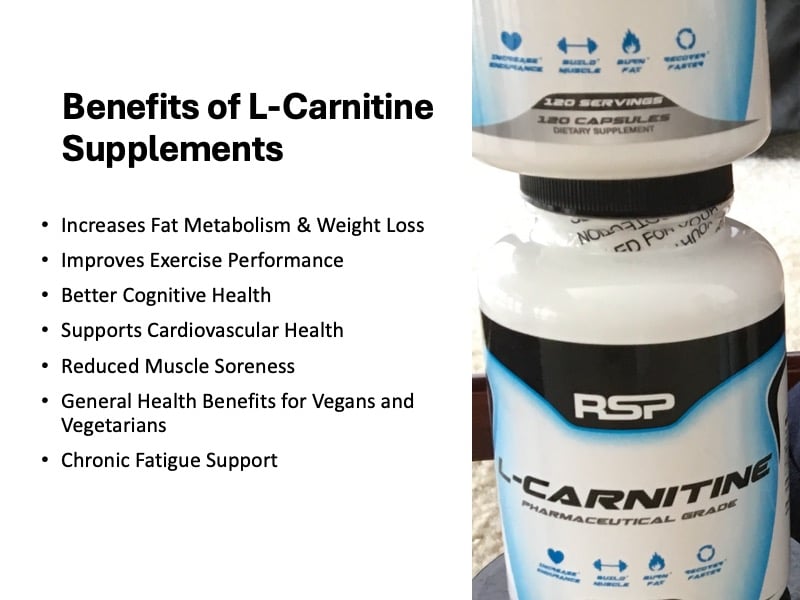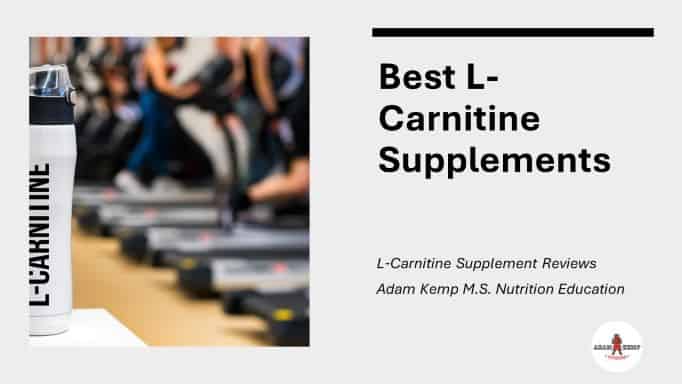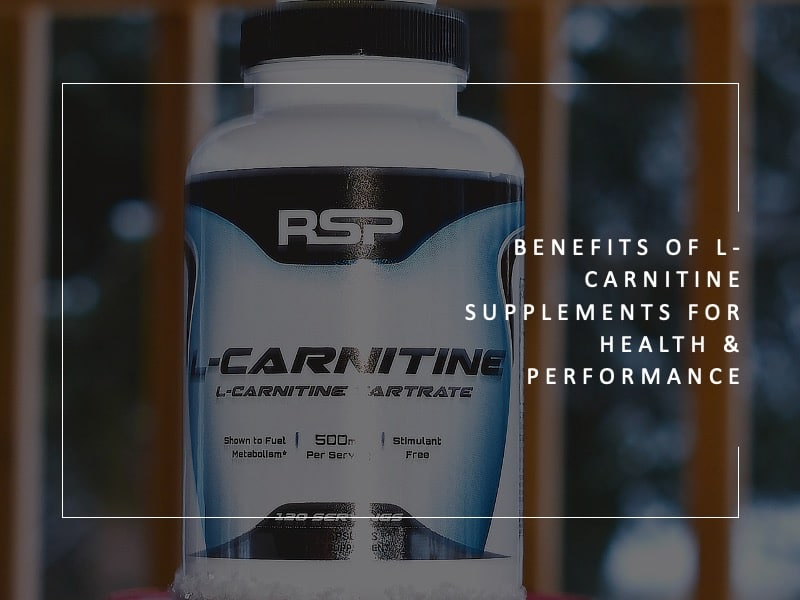L-Carnitine: Benefits, Side Effects, Uses & Best Supplements
Although often used as a weight loss supplement, the benefits of L-carnitine extend far beyond fat burning.
From boosting endurance and accelerating recovery to improving cognitive performance and supporting heart health, L-carnitine is a powerhouse nutrient when used strategically.
As a professional athlete with over a decade of experience in high-level basketball and a Master’s degree in Nutrition Education, I’ve experimented with countless supplements to speed up recovery, increase energy, and improve body composition.
When I first started my fitness journey, lifting weights and reading bodybuilding forums in the late 2000s, I was drawn to L-carnitine supplements because of the science behind its fat-burning potential.
I believed it would be a magic solution for weight loss, helping me achieve low body fat and optimal body composition.
While L-carnitine isn’t a miracle pill, I’ve found consistent benefits in using it as part of a well-rounded supplement regimen.
L-carnitine plays a critical role in mitochondrial energy production by transporting fatty acids into cells where they’re burned for fuel.
That’s why it’s a staple in many performance-enhancing stacks, and why I still incorporate it into my routine during intense training cycles or recovery periods.
Although L-carnitine isn’t a magic solution for weight loss, its ability to increase fat metabolism, support workout recovery, and provide clean energy makes it a useful tool for athletes, fitness devotees, and health-conscious individuals alike.
If you’re curious about whether this supplement is right for you, or how to use it most effectively, keep reading to learn science-backed L-carnitine benefits, real-world insights from my career, and product recommendations that suit different fitness goals.
What is L-Carnitine?
L-carnitine is a naturally occurring compound synthesized from the amino acids lysine and methionine, and it plays a central role in the body’s energy metabolism.
Its primary function is to transport long-chain fatty acids into the mitochondria, the energy-producing structures inside cells, where fat is oxidized and converted into usable fuel.
The human body produces L-carnitine in small amounts, but levels can vary based on diet, genetics, and lifestyle factors.
L-carnitine is found most abundantly in red meat, especially beef, lamb, and bison.
This is why individuals following plant-based diets or with certain metabolic conditions may benefit from L-carnitine supplementation.
Because of its critical role in fat metabolism and cellular energy production, L-carnitine has become a popular supplement among athletes, weightlifters, and those seeking natural support for fat loss, endurance, and recovery.
Specific forms like acetyl L-carnitine (ALCAR) are even used for brain health and cognitive performance, adding to its wide range of applications.
What Does L-Carnitine Do?
L-carnitine helps your body convert fat into energy by transporting fatty acids into the mitochondria, where they are burned for fuel.
This function is especially important during exercise, when your body needs to tap into stored fat for sustained performance.
Beyond its fat-metabolizing role, L-carnitine also helps reduce lactic acid buildup, speeds up muscle recovery, and may improve oxygen utilization during physical activity (Fielding et al., 2018).
These effects can translate into greater endurance, less post-workout soreness, and improved overall performance.
Certain forms of L-carnitine, like acetyl L-carnitine (ALCAR), cross the blood-brain barrier and support brain energy metabolism, which can aid in mental clarity, mood, and cognitive function.
From powering your workouts to promoting metabolic efficiency, the benefits of L-carnitine are wide-ranging and impactful for both athletic performance and overall health.
Is Dietary L-Carnitine Enough?
For many people, dietary L-carnitine, primarily found in red meat, poultry, and dairy, can be sufficient to support basic metabolic needs.
However, the amount of L-carnitine your body absorbs from food varies depending on factors like age, activity level, and individual metabolism.
Athletes, active individuals, and people following plant-based or vegetarian diets may not get enough L-carnitine through food alone to optimize performance, recovery, or fat metabolism.
This is where L-carnitine supplementation becomes valuable.
Research shows that supplementing with L-carnitine can raise tissue levels more effectively than diet alone, particularly in muscle cells where it helps boost endurance, fat oxidation, and post-exercise recovery (Broad et al., 2011; Galloway et al., 2005).
So, while a nutrient-rich diet is the foundation of good health, the benefits of L-carnitine are more pronounced when supplementation is used to address increased demands or specific goals like fat loss or athletic performance.
Types of L-Carnitine Supplements
L-Carnitine exists in several forms, but the most biologically active types include:
- Acetyl L-Carnitine (ALCAR): Known for cognitive benefits.
- L-Carnitine L-Tartrate (LCLT): Commonly used in sports supplements due to its quick absorption rate.
- Propionyl L-Carnitine (PLC): Often used for cardiovascular health.
Benefits of L-Carnitine Supplements

There are numerous benefits of l carnitine supplements, including their roles in fat metabolism, exercise performance, and recovery.
While not a stand-alone solution for weight loss, carnitine supplements can complement a healthy lifestyle, enhancing physical performance and aiding recovery from intense workouts.
Whether you’re an athlete or simply looking to improve your health, here are a few of the most prominent health benefits of l carnitine supplements:
Increases Fat Metabolism & Weight Loss
While L-carnitine isn’t a stimulant-based fat burner, it plays a significant metabolic role by increasing fat oxidation, particularly during exercise, which can help support weight loss over time.
L-Carnitine is essential for fat oxidation, helping transport fatty acids into the mitochondria where they are burned for energy.
This process is especially useful during exercise, potentially improving endurance by preserving glycogen stores.
Studies suggest that L-carnitine can increase fat oxidation during both high-intensity and low-to-moderate-intensity exercises (Mielgo-Ayuso et al., 2021).
A 2020 systematic review and meta-analysis of 37 randomized controlled trials involving over 2,200 participants found that L-carnitine supplementation led to modest but statistically significant reductions in body weight (-1.21 kg), BMI (-0.24 kg/m²), and fat mass (-2.08 kg) (Talenezhad et al., 2020).
The analysis also identified a nonlinear dose-response relationship, with 2,000 mg per day offering the most benefit for weight reduction.
While it didn’t significantly affect waist circumference or body fat percentage, these findings support L-carnitine’s role as a complementary tool for weight management, especially in overweight or obese adults, when combined with exercise and healthy eating habits.
Rather than being a miracle solution, the benefits of L-carnitine for weight los
Improves Exercise Performance
Research shows that L-carnitine can improve exercise performance by reducing lactic acid buildup, which is a primary cause of muscle fatigue (Heinonen, 2012).
Supplementing with L-carnitine has been shown to increase peak power, improve endurance, and lower perceived exertion during high-intensity exercises (Mielgo-Ayuso et al., 2021).
L-carnitine supplementation also aids in muscle recovery by reducing exercise-induced muscle damage and oxidative stress.
Better Cognitive Health
Among the many forms of L-carnitine, Acetyl L-carnitine (ALCAR) has excellent nootropic potential.
ALCAR is capable of crossing the blood-brain barrier, where it supports mitochondrial function, acetylcholine production, and neuronal energy metabolism, the three pillars of optimal brain health.
Research suggests that ALCAR may increase mental clarity, focus, and short-term memory, especially in individuals experiencing age-related cognitive decline (Pennisi et al., 2020).
A notable randomized controlled trial found that ALCAR supplementation improved both cognitive performance and functional status in elderly patients with mild cognitive impairment (Malaguarnera et al., 2007).
Beyond aging populations, ALCAR has been studied for its anti-fatigue properties, making it a valuable natural nootropic for those struggling with brain fog, burnout, or low mental energy.
By improving mitochondrial efficiency in the brain, ALCAR helps enhance mental stamina, attention, and overall cognitive resilience under stress.
Its combined support for physical energy and brain performance makes ALCAR one of the best nootropics for energy and cognitive health, especially when used alongside a nutrient-dense diet and consistent lifestyle habits.
Supports Cardiovascular Health
L-Carnitine may also support heart health.
By enhancing fatty acid metabolism in the heart, it has been shown to improve heart function in individuals with cardiovascular conditions like angina or heart failure (Wang et al., 2018).
L-Carnitine supplementation may also reduce inflammatory markers, further supporting overall heart health.
Reduced Muscle Soreness
L-carnitine supplementation has been shown to help you recover faster after workouts by reducing delayed onset muscle soreness (DOMS) and minimizing exercise-induced muscle damage, making it a valuable addition for athletes and training enthusiasts alike.
Studies reveal that L-carnitine helps limit oxidative stress and inflammation by decreasing markers such as creatine kinase (CK) and malondialdehyde (MDA) post-exercise (Caballero-García et al., 2023).
These biomarkers are associated with muscle breakdown and cellular stress from intense training.
By reducing them, L-carnitine not only shortens recovery time but also helps maintain training quality across consecutive sessions.
In practical terms, this means less soreness after heavy strength training or endurance workouts, improved performance in follow-up sessions, and better long-term adaptation to exercise.
This benefit becomes especially important for high-frequency training schedules or in-season athletic demands.
General Health Benefits for Vegans and Vegetarians
Since L-carnitine is predominantly found in red meat and other animal products, vegans and vegetarians often have lower plasma and muscle carnitine levels, which may impact energy metabolism and endurance capacity over time.
Supplementing with L-carnitine can help close this nutritional gap by supporting efficient fat oxidation, cellular energy production, and mitochondrial function—particularly during physical activity.
This can translate into improved stamina, cognitive clarity, and recovery for plant-based individuals.
Additionally, research suggests that L-carnitine may help reduce fatigue in those with naturally low dietary intake while also supporting cardiovascular function.
This is especially relevant for individuals at risk of nutrient shortfalls due to dietary restrictions.
For vegans and vegetarians looking to maintain high performance, the benefits of L-carnitine supplementation can be both preventive and performance-enhancing.
Chronic Fatigue Support
L-carnitine has shown promise as a therapeutic option for chronic fatigue, especially in post-viral conditions like long-COVID.
It plays a vital role in mitochondrial energy production by transporting fatty acids into cells for ATP generation, which is often impaired in people with persistent fatigue.
A 2021 review highlighted L-carnitine’s potential to reduce fatigue in post-COVID-19 patients, similar to its benefits in cancer-related fatigue, multiple sclerosis, and chronic fatigue syndrome (Vaziri-Harami & Delkash, 2021).
Supplementation may help restore muscle strength, mental clarity, and overall energy levels by reducing inflammation, preserving muscle mass, and supporting acetylcholine synthesis in the brain.
Low carnitine levels are commonly seen in fatigue-related illnesses and are associated with weakness, brain fog, and decreased productivity.
For individuals experiencing lingering fatigue, especially after viral infections, L-carnitine may help support energy metabolism and recovery.
Its broad physiological benefits position it as one of the most promising supplements for chronic fatigue and post-viral health restoration.
How to Use L-Carnitine Supplements
Using L-carnitine effectively depends on your health goals, the form of L-carnitine you choose, and your daily routine.
Whether you’re taking it for fat metabolism, energy, cognitive function, or recovery, timing and dosage play key roles in maximizing its benefits.
How Much L-Carnitine Per Day?
The ideal L-carnitine dosage per day depends on your goals and the specific form you’re taking:
- General health or mild fatigue: 500–1,000 mg daily
- Fat loss and endurance: 1,000–2,000 mg daily
- Cognitive support (Acetyl L-carnitine): 600–1,500 mg daily, often divided into 2 doses
- Clinical doses for chronic fatigue or therapeutic purposes: Up to 3,000 mg, under medical supervision
Research suggests that 2,000 mg per day provides the maximum weight loss benefit in adults without increased risk of side effects (Talenezhad et al., 2020).
Start at a lower dose to assess tolerance, especially if you’re using L-carnitine L-tartrate, which can cause digestive discomfort in higher doses.
When to Take L-Carnitine
The best time to take L-carnitine depends on your primary reason for using it:
- For fat burning and exercise performance: Take L-carnitine 30–60 minutes before your workout, ideally with a small meal containing carbohydrates to enhance absorption.
- For general energy support: Take it in the morning or early afternoon, when your energy needs are highest.
- For cognitive support (ALCAR): Split the dosage into morning and early afternoon, especially if using it as a nootropic.
Avoid taking L-carnitine late in the evening, as it may interfere with sleep in sensitive individuals.
Always drink plenty of water when supplementing and monitor for digestive sensitivity, especially if you’re taking it in liquid or powder form.
Best L-Carnitine Supplements

When selecting an L-Carnitine supplement, it’s important to consider factors like potency, formulation, convenience, and price.
Depending on your health goals, such as fat metabolism, cognitive enhancement, or improved exercise recovery, you might prefer a specific type or blend of L-carnitine.
Here’s an expanded look at some of the best l-carnitine supplements:
Dr. Martin’s Nutrition L-Carnitine
This supplement stands out for its affordability and high potency.
Each serving provides 1,000 mg of L-Carnitine, which is excellent for supporting fat metabolism and energy production during workouts. With 200 capsules per bottle, it’s one of the most cost-effective options on the market.
The high dosage per serving allows for efficient results, especially for athletes aiming to enhance endurance and speed up recovery.
- Best for: Those looking for a high-potency supplement at a reasonable price.
- Pros: Strong dose of L-Carnitine, highly affordable.
- Cons: Pure L-Carnitine without additional ingredients, making it less multifunctional for users looking for combined benefits.
Last update on 2025-04-18 / This article includes affiliate links/Images via Amazon Product Advertising API. I may earn commissions on purchases made through these links.
Bulk Supplements L-Carnitine
For those who want to save money and don’t mind a powder form, Bulk Supplements offers pure L-Carnitine at a very low price per serving.
While it’s a cost-effective choice, the powder form may not be convenient for everyone. Additionally, the powder has a distinctive odor that might be off-putting for some users.
- Best for: Budget-conscious individuals who want a pure L-Carnitine supplement.
- Pros: Very inexpensive, pure L-Carnitine with no additives.
- Cons: Comes in powder form, which may be less convenient; strong odor can be unpleasant.
Last update on 2025-04-18 / This article includes affiliate links/Images via Amazon Product Advertising API. I may earn commissions on purchases made through these links.
NOW Foods L-Carnitine
NOW Foods is known for its high-quality supplements, and their L-Carnitine offering is no different. At $0.27 per serving, this product provides excellent value for those who trust reputable brands.
NOW Foods’ L-Carnitine is ideal for individuals who prefer capsule form and a reliable, consistent product.
- Best for: Those seeking a trusted brand with consistent quality.
- Pros: Affordable, from a reputable company.
- Cons: Standard dosage, without any additional ingredients to enhance its effects.
Last update on 2025-04-18 / This article includes affiliate links/Images via Amazon Product Advertising API. I may earn commissions on purchases made through these links.
RSP Nutrition AminoLean
RSP Nutrition AminoLean offers a versatile pre-workout option, combining L-Carnitine with a blend of other fat-burning ingredients such as CLA, green tea extract, and caffeine.
While the exact amount of L-Carnitine in the proprietary blend isn’t specified, the inclusion of amino acids makes AminoLean one of the best supplements for weight loss and muscle building, as it provides excellent energy, fat loss, and muscle recovery.
This supplement is ideal for individuals seeking a multi-functional pre-workout boost.
- Best for: Those looking for a pre-workout with energy-boosting and fat-burning properties.
- Pros: Contains a blend of ingredients that enhance workout performance and recovery.
- Cons: L-Carnitine content is part of a proprietary blend, so specific dosage isn’t clear.
Last update on 2025-04-18 / This article includes affiliate links/Images via Amazon Product Advertising API. I may earn commissions on purchases made through these links.
XTEND Ripped BCAA Powder
XTEND BCAAs Ripped BCAA Powder is another versatile blend containing L-carnitine that supports muscle recovery while promoting fat loss, making it a great option for athletes during cutting phases.
With 7 grams of BCAAs in the 2:1:1 ratio for muscle recovery and fat-burning ingredients like L-carnitine, CLA , and Capsimax, I believe it is one of the best supplements for weight loss and ideal for improving performance and body composition.
The sugar-free formula ensures you’re not adding unnecessary calories, while the delicious flavors like Blueberry Lemonade make it enjoyable to drink.
- Best for: Individuals combining fat loss with muscle recovery in their fitness routine.
- Pros: Dual action for muscle recovery and fat loss with a great taste.
- Cons: Contains artificial flavors, which may not suit everyone.
Last update on 2025-04-18 / This article includes affiliate links/Images via Amazon Product Advertising API. I may earn commissions on purchases made through these links.
Final Thoughts: Should You Take L-Carnitine Supplements?
L-carnitine isn’t a miracle pill, but it’s a science-backed supplement that offers real benefits for those looking to improve fat metabolism, energy levels, exercise recovery, and even brain function.
Whether you’re an athlete aiming for better endurance, someone managing post-workout fatigue, or simply looking for a metabolic edge, the benefits of L-carnitine can be meaningful when used consistently and intentionally.
It’s most effective when paired with a healthy diet, regular physical activity, and proper supplementation timing.
For those following a plant-based diet or experiencing chronic fatigue, L-carnitine may help fill nutritional gaps and restore energy balance.
As always, start with a moderate dose, monitor how your body responds, and choose a form that aligns with your specific goals, whether it’s L-Carnitine L-Tartrate for workouts or Acetyl L-Carnitine for cognitive support.
When used wisely, L-carnitine can be a valuable addition to a well-rounded health and performance strategy.








